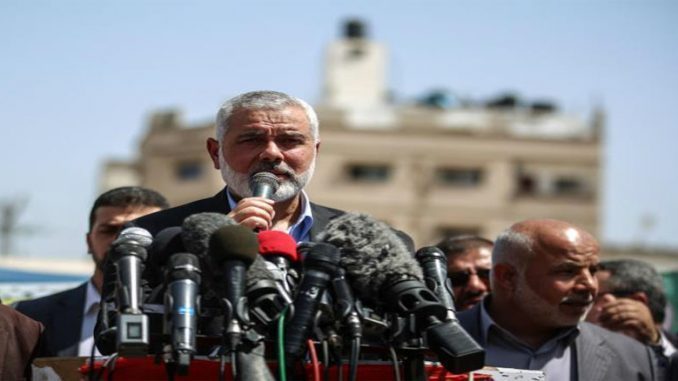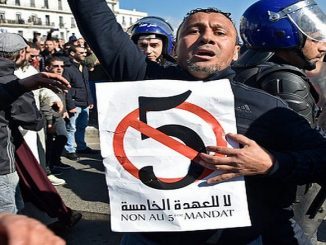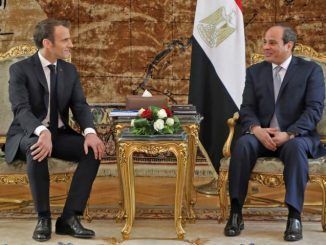
State Department says Haniyeh has been ‘involved in terrorist attacks’ on Israeli citizens and is a ‘proponent of armed struggle… against civilians’
The United States on Wednesday put the head of Hamas, Ismail Haniyeh, on its terrorism blacklist in a move that will raise tensions already high due to Washington’s recognition of Jerusalem as Israel’s capital.
“Haniyeh has close links with Hamas’ military wing and has been a proponent of armed struggle, including against civilians,” the State Department said in a statement.
“He has reportedly been involved in terrorist attacks against Israeli citizens. Hamas has been responsible for an estimated 17 American lives killed in terrorist attacks.”
The 55-year-old Haniyeh, who was named head of Hamas in May 2017, is now on the US Treasury sanctions blacklist, which freezes any US-based assets he may have and bans any US person or company from doing business with him.
He is now a “Specially Designated Global Terrorist”, or SDGT, a title used to describe leaders of international terrorism organisations or perpetrators of mass-scale terrorism attacks. Hamas, which controls Gaza, has been officially considered a terrorist organisation by the US for decades.
‘A failed attempt’
A spokesperson for Hamas told Middle East Eye that placing Haniyeh on the list was an attempt to legitimise the Israeli occupation of Palestine.
Putting the Hamas leader on the list is “is a failed attempt to put pressure on the resistance, and will not deter us from continuing to uphold resistance as a tool to expel the occupation,” the spokesperson said.
“The decision of the US treasury reveals the extent of US bias towards the Israeli occupation and their participation in denying the rights of our people, and this decision is an attempt to legitimise the occupation,” he said.
Leaders committing crimes against the Palestinian people should be on the list instead, he added.
The State Department also designated Harakat al-Sabireen, a group which operates in Gaza, and two Egyptian groups – Liwa al-Thawra and Harakat Sawa’d Misr (HASM) – as terrorist organisations.
“Some of the leaders of the violent splinter groups, Liwa al-Thawra and Hasm, were previously associated with the Egyptian Muslim Brotherhood,” a statement by the State Department noted.
The Trump administration reportedly considered blacklisting the Brotherhood last year. Muslim American groups had warned against such designation, saying that it would be used to target all Muslims in the US.
The popular Islamist movement has been outlawed in Egypt, Saudi Arabia and the UAE.
In Egypt, where the military overthrew Mohammed Morsi, the country’s first democratically elected president who was a member of the Muslim Brotherhood, the group says it is committed to peaceful political activism.
The department said Wednesday’s designations “target key terrorist groups and leaders… who are threatening the stability of the Middle East, undermining the peace process and attacking our allies Egypt and Israel”.
“Ismail Haniyeh is the leader and president of the political bureau of Hamas, which was designated in 1997 as a Foreign Terrorist Organisation and in 2001 as an SDGT.”
“These designations seek to deny Ismail Haniyeh, Harakat al-Sabireen, Liwa al-Thawra, and HASM the resources they need to plan and carry out further terrorist attacks.”
Obstacle to Palestinian reconciliation
Tareq Baconi, an Al Shabaka policy member and the author of the forthcoming book Hamas Contained: The Rise and Pacification of Palestinian Resistance, said while it was clear that the US made the move to continue its efforts to pressure Hamas, it was interesting that Haniyeh was chosen.
“Haniyeh is one of the moderate leaders so this is a bit illogical,” Baconi told Middle East Eye.
In addition to impacting Haniyeh’s ability to travel and raise funds, he said, the US designation will put pressure on Palestinian President Mahmoud Abbas not to reconcile with Hamas.
It will also keep Hamas “needy and cornered” and therefore dependent on working with Egyptian President Abdel Fattah al-Sisi in order to keep the Rafah border open, he added.
Relations between Washington and the Palestinians have been severely strained since the US president, Donald Trump, broke with decades of policy in December to name Jerusalem as Israel’s capital.
The Hamas leader voiced rage over the decision, saying it “crosses every red line”, and called for a new intifada, or uprising.
“This Zionist policy supported by the US cannot be confronted unless we ignite a new intifada,” he said.



